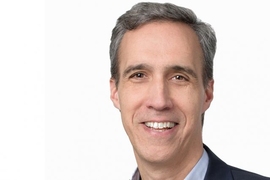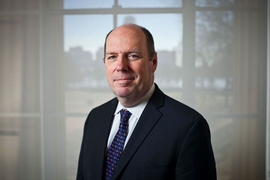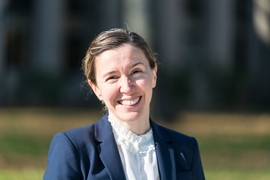As part of the founding of the MIT Stephen A. Schwarzman College of Computing, the Department of Electrical Engineering and Computer Science (EECS), the largest academic unit at MIT, has been restructured to provide a stronger base for enhancing existing programs, creating new opportunities, and increasing connections to other parts of the Institute.
Jointly part of the School of Engineering and Schwarzman College of Computing, EECS is now composed of three overlapping sub-units in electrical engineering (EE), computer science (CS), and artificial intelligence and decision-making (AI+D), which brings together computer science-heritage AI and machine learning with electrical engineering-heritage information and decision systems to exploit their significant synergies. The department will remain responsible for Course 6.
The organizational plan for EECS was developed over the summer based on the final report of the Organizational Structure Working Group of the Computing Task Force.
“It is hard to imagine a School of Engineering without electrical engineering and a College of Computing without computer science. We expect that the creation of this new configuration will lead to a highly collaborative approach not only within EECS, but across campus and across disciplines,” says Dan Huttenlocher, dean of the MIT Schwarzman College of Computing.
The plan calls for each of the units, termed a “faculty” to signify its differentiation from a traditional academic structure, each managed by a head of the faculty to lead the respective area and to contribute to the overall leadership of EECS, under the direction of the department head who will continue to oversee cross-cutting matters. The three faculty heads and the EECS head will each report jointly to Huttenlocher and to Anantha Chandrakasan, dean of the MIT School of Engineering.
“This restructure will provide more autonomy to each unit,” says Chandrakasan. “The faculties will focus on faculty recruiting, mentoring, promotion, academic programs, and community building.”
Asu Ozdaglar, Distinguished Professor of Engineering, a principal investigator at the Laboratory for Information and Decision Systems, and the newly appointed deputy dean of academics for the College of Computing, will remain the head of EECS, a position she has held since 2018. During her tenure, Ozdaglar has championed initiatives such as curriculum innovations to keep up with the ever-growing interest in computing, creation of new joint majors such as 6-14 (Computer Science, Economics, and Data Science), and Rising Stars in EECS, a workshop for female graduate students and postdocs interested in pursuing academic careers in computer engineering and electrical engineering, among many others.
Joel Voldman, a professor of electrical engineering and computer science and an associate department head at EECS, will be the head of the faculty of electrical engineering. A principal investigator in the Research Laboratory of Electronics and the Microsystems Technology Laboratories, Voldman’s research focus is on developing microfluidic technology for biology and medicine, with an emphasis on cell sorting and immunology. In addition, he co-developed two introductory EECS courses: 6.03 (Introduction to EECS via Medical Technology) and 6.S08/6.08 (Interconnected Embedded Systems), and recently helped revise 6.002 (Circuits and Electronics).
Arvind, the Charles W. and Jennifer C. Johnson Professor in Computer Science and Engineering, will step into the role of head of the faculty of computer science. Arvind’s research focuses on the specification and synthesis of complex digital systems, including microprocessors and accelerators, using a formalism known as guarded atomic actions. He leads the Computation Structures Group in the Computer Science and Artificial Intelligence Laboratory (CSAIL), and is a fellow of the Institute of Electrical and Electronics Engineers (IEEE) and the Association for Computing Machinery. He was elected into the National Academy of Engineering in 2008 and the Academy for Arts and Sciences in 2012.
Antonio Torralba, the Thomas and Gerd Perkins Professor of Electrical Engineering and Computer Science, has been named the head of the faculty of artificial intelligence and decision-making. A principal investigator at CSAIL, a member of the Center for Brains, Minds, and Machines, and director of the MIT Quest for Intelligence and MIT-IBM Watson AI Lab, Torralba is the recipient of the 2008 National Science Foundation Career award, the best student paper award at the IEEE Conference on Computer Vision and Pattern Recognition in 2009, and the 2010 J.K. Aggarwal Prize from the International Association for Pattern Recognition. In 2017, he received the Frank Quick Faculty Research Innovation Fellowship and the Louis D. Smullin (’39) Award for Teaching Excellence.
An advisory search committee made up of EECS faculty members — Ozdaglar (chair), Hari Balakrishnan, Marc Baldo, Duane Boning, Tommi Jaakkola, Patrick Jaillet, Dina Katabi, Jing Kong, Tomas Lozano-Perez, Alan Oppenheim, Daniela Rus, Armando Solar-Lezama, Collin Stultz, Ryan Williams, and Daniel Hastings — was formed to identify candidates to lead all three units to help guide the two deans in selecting the heads.
Voldman, Arvind, and Torralba will begin their respective appointments on Jan. 1, 2020. Current Associate Department Head Saman Amarasinghe, an EECS professor and lead of the Commit compiler research group in CSAIL, will continue in his role until the new heads start their positions.
“Thank you to everyone who served on the search committee and to Professer Amarasinghe for his tremendous leadership and contributions to EECS as an associate head. And please join us in congratulating Asu, Antonio, Arvind, and Joel for taking on these important new roles,” says Chandrakasan.
“We look forward to working with the new leadership and all of the faculty in the department to help make EECS even stronger for our students and the MIT community, and more broadly, in leading this rapidly changing area,” adds Huttenlocher.











